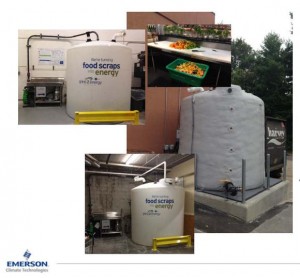You are probably aware of the shocking figure — up to 40% of the food produced in the U.S. goes uneaten. As Green Needham explores local solutions to food waste, we will be highlighting businesses that are making efforts to avoid generating food waste in the first place and then putting the remaining food waste to productive uses.

Our partners at Wellesley 3R (reduce, reuse, recycle) recently invited a few Green Needham members to accompany them on a tour of the Whole Foods store in Framingham. The star of the day was the store’s Emerson “grind2energy” system. Imagine a large sink with a giant garbage disposal which grinds food waste and pipes the pulp into a vat behind the store. Pickups every 2 weeks bring the pulp to Jordan’s Dairy Farm in Rutland, MA. There, the pulp is mixed with cow manure and with liquid dairy waste and put into the farm’s anaerobic digester. The biogas produced from the waste decomposition is captured and used to make electricity, enough to power the entire farm and 300 homes.
Karen Franczyk, Whole Foods green mission coordinator of the North Atlantic region, explained that 25% of North Atlantic Whole Foods stores have a grinder system. They are either revenue neutral or actually save money compared to the cost of disposal. This is important, since effective October 1, 2014, all Massachusetts businesses and institutions disposing of over one ton of commercial organic material per week are no longer allowed to dispose of it as trash.
Other measures are taken in the store to reduce food waste at the source. Computers allow daily monitoring of what is ordered and what is sold, so that overbuying is avoided. Donations of edible food occur 5-7 days a week. Much food is used to make prepared food within the store — unsold bread becomes stuffing or bread crumbs; ripe avocados are used for guacamole.
Whole Foods in Framingham provides an interesting example of the multiple benefits of reducing food waste. Green Needham is currently conducting a food waste survey of Needham businesses and organizations that serve food, and is working to follow that up with a free waste-reduction workshop to be offered through RecyclingWorks, a state-funded business assistance program.

